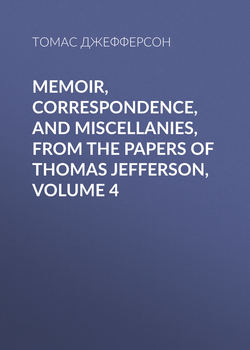Читать книгу Memoir, Correspondence, And Miscellanies, From The Papers Of Thomas Jefferson, Volume 4 - Томас Джефферсон, Thomas Jefferson - Страница 71
LETTER LXXI.—TO DOCTOR JAMES BROWN, October 27, 1808
ОглавлениеTO DOCTOR JAMES BROWN.
Washington, October 27, 1808.
Dear Sir,
You will wonder that your letter of June the 3rd should not be acknowledged till this date. I never received it till September the 12th, and coming soon after to this place, the accumulation of business I found here has prevented my taking it up till now. That you ever participated in any plan for a division of the Union, I never for one moment believed. I knew your Americanism too well. But as the enterprise against Mexico was of a very different character, I had supposed what I heard on that subject to be possible. You disavow it; that is enough for me, and I for ever dismiss the idea. I wish it were possible to extend my belief of innocence to a very different description of men in New Orleans; but I think there is sufficient evidence of there being there a set of foreign adventurers, and native malcontents, who would concur in any enterprise to separate that country from this. I did wish to see these people get what they deserved; and under the maxim of the law itself, that inter arma silent leges, that in an encampment expecting daily attack from a powerful enemy, self-preservation is paramount to all law, I expected that instead of invoking the forms of the law to cover traitors, all good citizens would have concurred in securing them. Should we have ever gained our Revolution, if we had bound our hands by manacles of the law, not only in the beginning, but in any part of the revolutionary conflict? There are extreme cases where the laws become inadequate even to their own preservation, and where the universal resource is a dictator, or martial law. Was New Orleans in that situation? Although we knew here that the force destined against it was suppressed on the Ohio, yet we supposed this unknown at New Orleans at the time that Burr’s accomplices were calling in the aid of the law to enable them to perpetrate its suppression, and that it was reasonable, according to the state of information there, to act on the expectation of a daily attack. Of this you are the best judge.
Burr is in London, and is giving out to his friends that that government offers him two millions of dollars the moment he can raise an ensign of rebellion as big as an handkerchief. Some of his partisans will believe this, because they wish it. But those who know him best will not believe it the more because he says it. For myself, even in his most flattering periods of the conspiracy, I never entertained one moment’s fear. My long and intimate knowledge of my countrymen satisfied and satisfies me, that, let there ever be occasion to display the banners of the law, and the world will see how few and pitiful are those who shall array themselves in opposition. I as little fear foreign invasion. I have indeed thought it a duty to be prepared to meet even the most powerful, that of a Bonaparte, for instance, by the only means competent, that of a classification of the militia, and placing the junior classes at the public disposal: but the lesson he receives in Spain extirpates all apprehensions from my mind. If, in a peninsula, the neck of which is adjacent to him, and at his command, where he can march any army without the possibility of interception or obstruction from any foreign power, he finds it necessary to begin with an army of three hundred thousand men, to subdue a nation of five millions, brutalized by ignorance, and enervated by long peace, and should find constant reinforcements of thousands after thousands necessary to effect at last a conquest as doubtful as deprecated, what numbers would be necessary against eight millions of free Americans, spread over such an extent of country as would wear him down by mere marching, by want of food, autumnal diseases, &c.? How would they be brought, and how reinforced, across an ocean of three thousand miles, in possession of a bitter enemy, whose peace, like the repose of a dog, is never more than momentary? And for what? For nothing but hard blows. If the Orleanese Creoles would but contemplate these truths, they would cling to the American Union, soul and body, as their first affection, and we should be as safe there as we are every where else. I have no doubt of their attachment to us in preference of the English.
I salute you with sincere friendship and respect.
Th: Jefferson.
